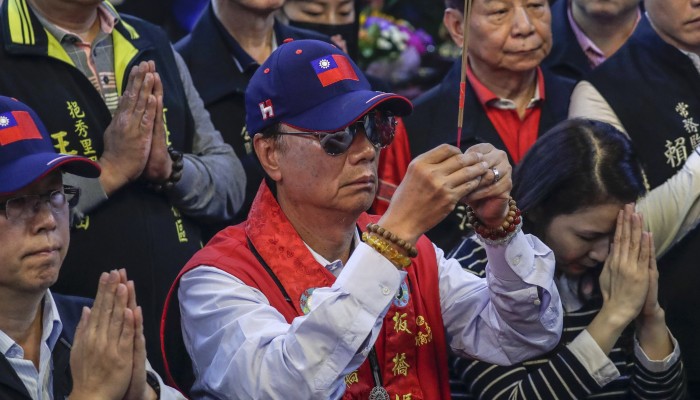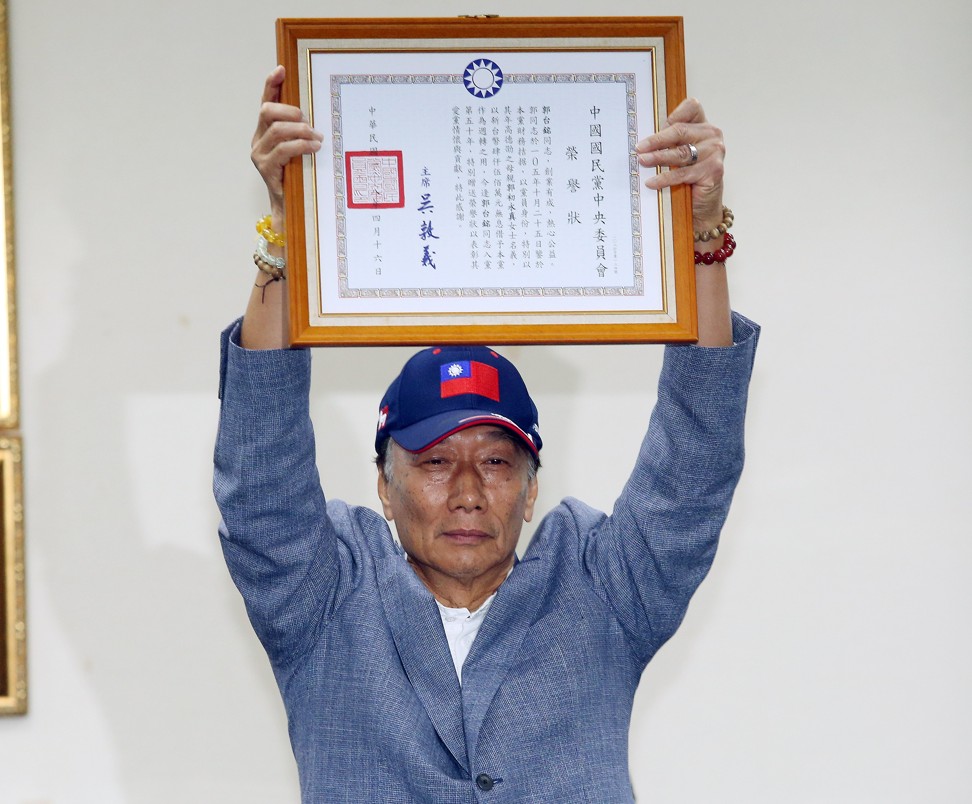
Foxconn billionaire chairman Terry Gou will make a run for Taiwan’s presidency, aiming to challenge incumbent Tsai Ing-wen in a race analysts said would pile more pressure on the island’s leader.
Gou, Taiwan’s richest man with a net worth of US$7.6 billion, said on Wednesday that he would take part in the opposition Kuomintang’s (KMT) primaries for the 2020 race.
“I am willing to [join others] in taking part in the party’s primary, and do not want to be selected to run under any special arrangement,” Gou said after a meeting with the KMT in Taipei.
“If I win [the primary], I will represent the party to run for president, and if I lose, I will give my full support to the winner during his campaign.”
Gou, 68, said that regardless of whether he remained an entrepreneur, he strongly believed Taiwan needed to maintain “peace, stability, the economy and the future”.
He called on the KMT to rebuild its core spirit to serve the country and the people, regain its honour and support young people.
“[It] is about duty and responsibility rather than making money. The people’s interests are always bigger than the party’s interests,” he said.
Also at the meeting, Gou accepted a citation from the KMT in recognition of his strong support for the Beijing-friendly party in recent years.
In 2016, Gou offered a no-interest loan of NT$45 million (US$1.5 million) to the cash-strapped party to help it through financial difficulties.
Earlier in the day, Gou said he was inspired to “do more things for Taiwan” after he dreamed of the sea goddess Matsu, a deity said to protect fishermen and sailors in the Taiwan Strait.
“Several days ago, I dreamed of Goddess Matsu, who asked me to do more things for the people in Taiwan ... and I will follow her instruction,” he said during a visit to a temple, hinting of his intention to run.

Gou shook the political landscape in Taiwan on Tuesday by suggesting that he could run for the island’s top post against Tsai, of the independence-leaning Democratic Progressive Party (DPP).
While Tsai declined to comment on his bid, politicians across the political spectrum were divided over his plan.
Former president Ma Ying-jeou said he was happy that Gou was willing to join other KMT aspirants in the primary. “As a world-class entrepreneur whose business spans the two sides of the Taiwan Strait as well as Europe and America, he has made great contributions to Taiwan’s economic development,” Ma said.
He said Gou’s involvement in the primary would help strengthen the party system and prevent internal disputes that could arise from simply drafting a candidate.
Ma confirmed reports that he had several meetings with Gou to discuss “relevant issues”.
Taiwanese news outlets had reported that Gou finally decided to run after Ma told him he would not seek another term.
Analysts said that if Gou was endorsed by the KMT, it would add to the pressure on Tsai, who also faces a challenge from one-time confidant William Lai, a former premier and fellow DPP member. Tsai has trailed other potential candidates in various opinion polls.
“Gou’s ability to run a business operation with more than a million staff in Taiwan, China, and other parts of the world proves that he knows how to deal with trade and economy, which is Tsai’s shortcoming,” political analyst Shen Fu-hsiung said.
That sentiment was echoed by fintech analyst Kirk Yang, known for his coverage of Foxconn.
“A successful businessmen like Gou can be a good president as evidenced by US President Donald Trump and former New York mayor Michael Bloomberg,” Yang said.
But Hu Yu-wei, head of the journalism department at Taipei’s Chinese Culture University, said Gou would have to step aside from his business empire to run for president.
Hu said Gou would also have to say whether he supported Beijing’s “one country, two systems” model to bring Taiwan back into the mainland’s fold.
Beijing considers Taiwan a wayward province that must returned to mainland China, by force if necessary.
Since she became president in 2016, Tsai has not heeded Beijing’s demands to accept the one-China principle, an understanding that there is “one China” but that each side can have its own understanding of what constitutes “China”.
She also rejected Chinese President Xi Jinping’s call in January for cross-strait unification under one country, two systems, a model applied in Hong Kong.
Raymond Burghardt, former head of Washington’s de facto embassy in Taipei, has said that if the KMT came to power in 2020, Taiwan could face more pressure from Beijing.
“[Beijing would] put in more requests and exert more pressure, putting more political matters on the negotiating table and attempting to clarify the one-China issue,” Burghardt said.
Gou founded Hon Hai Precision Industry, better known as Foxconn, in 1974 with US$7,500 and 10 staff in Taiwan. The company has factories in a number of countries, employing more than a million workers, mostly in mainland China.
In 2017, he visited the White House and met Trump before announcing a plan to increase investment in the United States.
He said that in a phone conversation with Trump in February, the US president suggested that Foxconn hire military veterans to meet the demand for tech workers.







